|
|
|
Sort Order |
|
|
|
Items / Page
|
|
|
|
|
|
|
| Srl | Item |
| 1 |
ID:
117740
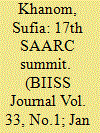

|
|
|
|
|
| Publication |
2012.
|
| Summary/Abstract |
This paper attempts to analyse the discussed issues and outcomes of the seventeenth SAARC Summit which took place in the Maldives from 10-11 November 2011 with a special reference to Bangladesh in the context of regional cooperation. Several significant and strategically important agreements were signed during this Summit with the intention to begin a new era of cooperation among the member countries. Therefore, the Summit declaration adopted several treaties like SAARC Agreement on Rapid Response to Natural Disasters, SAARC Seed Bank, SAARC Agreement on Multilateral Arrangement on Recognition of Conformity Assessment, and the SAARC Agreement on Implementation of Regional Standards. The agreements focused on enhancing and facilitating regional transit and connectivity, economic growth, ensuring energy security, combating terrorism and human trafficking and fight climate change. Though the Summit has come up with some promising mutual agreements, its success will depend on their proper and timely implementation. The lack of political will, problem of poor governance, weak economy and disparity, crisis of political leadership, ethnic, socio-cultural and religious divisions, challenges of non-state actors, transnational security challenges are considered to be the major hindrances to the success of regional integration. The South Asian region should develop its own short, medium, and long-term strategies for economic integration where each stage should be implemented effectively before moving on to the next in order to build a sound foundation for progress. The inclusion of China as 'dialogue partner' would help SAARC to make the tangible progress for regional cooperation in South Asia. The new focus on regional integrations is likely to create exciting opportunities for Bangladesh if it can exploit the synergies based on comparative advantages, investment in cross-border infrastructure projects, address challenges in governance, environmental and social developments.
|
|
|
|
|
|
|
|
|
|
|
|
|
|
|
|
| 2 |
ID:
125302
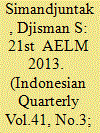

|
|
|
|
|
| Publication |
2013.
|
| Summary/Abstract |
Aspiring to serve the world as inclusive and sustainable growth is perhaps the most attractive of all the messages and intents that the 21st APEC Economic Leaders` Meeting (21st AELM) in Bali spread through its lengthy Bali Declaration. Given European Union`s incapacitation in the wake of austere policies made necessary by structural government deficits and other growth depressors, including aging, sizeable expansionary impulses that can pull the world economy out of descending trend in the short run can only come from APEC economies. Even through the united states (US) and to a lesser extent Japan are tightly social security expenditure, increase taxes and or sell assets in order to get back to a necessary fiscal balance, APEC can count on China, Southeast Asia, Republic of Korea (ROK) , and Russia as sources of stimulatory impacts on the world economy.
|
|
|
|
|
|
|
|
|
|
|
|
|
|
|
|
| 3 |
ID:
054471


|
|
|
| 4 |
ID:
112820
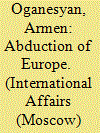

|
|
|
|
|
| Publication |
2012.
|
| Summary/Abstract |
WE ARE WATCHING the "abduction of Europe": the European dream of many generations of great European politicians is melting away. It was immediately after the war that Robert Schuman, Jean Monnet, Winston Churchill, Charles de Gaulle, Konrad Adenauer, Paul-Henri Spaak and many others laid the ideological foundation of united Europe. In 1962, Harold Macmillan disappointed his audience by saying to the EEC prime ministers that his country was determined to integrate into Europe. The British primer was convinced that his country could look forward to economic growth only as part of a big continental bloc. Today, the British press has dismissed this as a superficial and short-sighted approach which nevertheless was accepted by the larger part of the establishment and which cost dearly to the nation. The Brits, however, are often pushed aside as an insular nation. Le Monde of France betrays its concern by asking "Will Europe repeat the history of the USSR?" It admits, with a great deal of bitterness, that the integration institutes and Euro-bureaucracy which have grown out of proportion "are treated in Europe at best with indifference or at worst are totally rejected."
|
|
|
|
|
|
|
|
|
|
|
|
|
|
|
|
| 5 |
ID:
148572
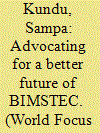

|
|
|
|
|
| Summary/Abstract |
BIMSTEC is a geographically-linked region and there are many problems which are common to BIMSTEC members. To refer from the stated objectives of BIMSTEC, its primary drives include creating an enabling environment for rapid economic development through identification and implementation of specific cooperation projects in the priority sectors; accelerating the economic growth and social progress in the sub-region through joint actions in a spirit of equality and partnership; promoting active cooperation and mutual assistance on matters of common interest in every fields of life including economy, society, science and so on; helping each other through training and research facilities in the educational, professional and technical spheres; cooperating more effectively in joint efforts that can support the national development plans of member nations which result in concrete benefits to the people in increasing their living standards, including employment generation and improved transportation and communication infrastructure; retaining close and beneficial cooperation with existing international and regional organizations with similar aims and purposes and finally, ensure best use of available synergies among BIMSTEC member countries.
|
|
|
|
|
|
|
|
|
|
|
|
|
|
|
|
| 6 |
ID:
099390
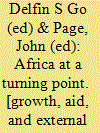

|
|
|
|
|
| Publication |
Washington, DC, World Bank, 2008.
|
| Description |
xxiv, 573p.
|
| Series |
Africa development essays
|
| Standard Number |
9780821372777
|
|
|
|
|
|
|
|
|
|
|
|
Copies: C:1/I:0,R:0,Q:0
Circulation
| Accession# | Call# | Current Location | Status | Policy | Location |
| 055308 | 330.967/DEL 055308 | Main | On Shelf | General | |
|
|
|
|
| 7 |
ID:
107222
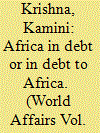

|
|
|
| 8 |
ID:
104790


|
|
|
| 9 |
ID:
087441
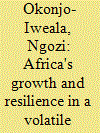

|
|
|
|
|
| Publication |
2009.
|
| Summary/Abstract |
Untill 2008, thanks to domestic policy reforms, external assistance and high commodity prices, most of the economies of sub-Saharan Africa experienced sustained and accelerating growth for over a decade. Poverty was declining, health and education indicators were improving- albeit from a low base and there were sighs that Africa's HIV/AIDS prevalence rate had begun to decline.
|
|
|
|
|
|
|
|
|
|
|
|
|
|
|
|
| 10 |
ID:
098222


|
|
|
| 11 |
ID:
123514
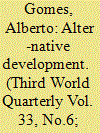

|
|
|
|
|
| Publication |
2012.
|
| Summary/Abstract |
The goal of this article is to outline an indigenous form of social ecology offered as an alternative development model. Based on the normative system of the Orang Asli (Malaysian Aborigines), this model is characterised by various social, cultural and ecological ideas and practices undergirding the interconnected conditions of equality, sustainability and peace, which engenders a better life for all within the community. I contend that this model will provide lessons on how we might develop a normative paradigm to serve as an alternative to the current ecological and socially unsustainable mainstream and neoliberal development policy and practice, obsessed with the attainment of economic growth and greater market integration.
|
|
|
|
|
|
|
|
|
|
|
|
|
|
|
|
| 12 |
ID:
132561
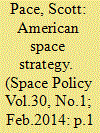

|
|
|
|
|
| Publication |
2014.
|
| Summary/Abstract |
This Viewpoint addresses American space strategy and the choices that lie before US space practitioners. Space activities today play critical roles in U.S. national security, economic growth, and scientific achievements. Satellite communications link the world. The Global Positioning System (GPS) is an integral part of several critical infrastructures, and enables functions ranging from survey and construction, to farming, finance, and air traffic management e not to mention US military forces worldwide. Less well understood is how the GPS time signal provides a global time base for encrypted communications e including point-of-sale transactions with credit or debit cards. Without GPS, much of today's economy would come to a halt. Beyond the Earth, we have rovers on the surface of Mars, and a probe that has left the solar system. The International Space Station represents a unique collaborative
partnership between the United States, Europe, Canada, Japan, and Russia. Spacefaring states are concerned with the long-term sustainability and security of space activities as a result of increasing orbital debris and the proliferation of space capabilities of new national entrants, some of them potential adversaries.
|
|
|
|
|
|
|
|
|
|
|
|
|
|
|
|
| 13 |
ID:
109521
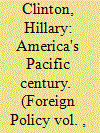

|
|
|
| 14 |
ID:
158535


|
|
|
|
|
| Summary/Abstract |
Japan's remarkable postwar growth spurt in the 1960s would not have been possible without Japan's alliance with the United States. Policy makers, political scientists, economists, historians, and journalists on both sides of the Pacific have made this claim, but no study has yet tested it with modern statistical methods. In this article, we compare the economic growth trajectories of Japan and a statistically constructed “synthetic” Japan, which had a similar profile until the late 1950s but did not experience the consolidation of the US–Japan alliance, a process that began in 1958 and culminated with the signing of a formal defense pact in January 1960. We find that Japan's per capita gross domestic product (GDP) grew much faster than the synthetic Japan's from 1958 to 1968. We substantiate these results with in-depth historical analyses on how the United States facilitated Japan's economic miracle.
|
|
|
|
|
|
|
|
|
|
|
|
|
|
|
|
| 15 |
ID:
068217
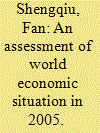

|
|
|
| 16 |
ID:
099774
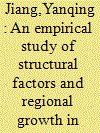

|
|
|
|
|
| Publication |
2010,
|
| Summary/Abstract |
Based on data of 31 Chinese provinces over the period 1980-2004, the study in this paper presents new evidence on the effects of structural shocks and structural transformation on growth and convergence among the Chinese regions. The division of overall regional growth in labour productivity into three components - growth due to structural shocks, growth due to structural transformation and a 'residual' indicating growth due to region-specific changes - provides us with a better framework than the traditional one-sector Solow growth model for attributing growth and convergence to various different sources. Among other findings, the study has shown that during 1990-1999, structural shocks worked to widen the gap between rich regions and poor regions in China, while structural transformation worked to narrow the gap.
|
|
|
|
|
|
|
|
|
|
|
|
|
|
|
|
| 17 |
ID:
099773
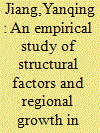

|
|
|
|
|
| Summary/Abstract |
Based on data of 31 Chinese provinces over the period 1980-2004, the study in this paper presents new evidence on the effects of structural shocks and structural transformation on growth and convergence among the Chinese regions. The division of overall regional growth in labour productivity into three components - growth due to structural shocks, growth due to structural transformation and a 'residual' indicating growth due to region-specific changes - provides us with a better framework than the traditional one-sector Solow growth model for attributing growth and convergence to various different sources. Among other findings, the study has shown that during 1990-1999, structural shocks worked to widen the gap between rich regions and poor regions in China, while structural transformation worked to narrow the gap.
|
|
|
|
|
|
|
|
|
|
|
|
|
|
|
|
| 18 |
ID:
188943
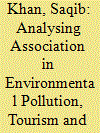

|
|
|
|
|
| Summary/Abstract |
Clean and green environment along with sustainable development is the prime objective of every state. We explore empirically the nexus between tourism, environmental pollution measured by carbon (CO2) emissions, population, trade, foreign direct investment (FDI) and economic growth in six countries from the Commonwealth of Independent States over 1995–2018. Traditional panel estimation technique is employed, where the Hausman test suggests fixed-effects over random effect estimator. We also employed the robust least squares (RLS) estimator to confirm the empirical estimates. Results show that a 1% increase in CO2 will attenuate the economic growth by 0.14% and that 1% raise in the tourism activities can boost growth by 0.04%. Both the fixed-effect and RLS estimates reveal that tourism, population growth and trade contribute significantly to economic growth, whereas CO2 adversely affect growth. The Granger causality test shows a two-way causality between economic growth and CO2 and between growth and trade. Empirical results also indicate a one-way causality between growth and FDI, population and FDI, population and CO2 along with population growth and tourism. These findings suggest that adopting effective policies that can expand trade, enhance FDI and promote the tourism sector with minimum environmental damage will ultimately accelerate sustainable economic development.
|
|
|
|
|
|
|
|
|
|
|
|
|
|
|
|
| 19 |
ID:
178277
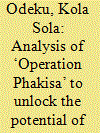

|
|
|
|
|
| Summary/Abstract |
South Africa is endowed with vast ocean resources and wealth which have the potential to provide enormous socio-economic goods and services to the people and create massive economic growth and wealth if vigorously explored and tapped. This assertion is made against the backdrop of the recent government strategical initiative, under the auspices of ‘Operation Phakisa’, to unlock and explore the full potential of the ocean’s wealth to drive economic growth, create jobs and alleviate poverty. This paper seeks to accentuate that the Operation Phakisa initiative has the potential to strategically unlock underexplored ocean resources for purposes of creating sustainable economic growth, development, and alleviation of hunger and poverty. It concludes that effective and sustainable use of the ocean’s wealth depends on good, efficient governance policies, practices and management. Methodically, a qualitative non-empirical research approach was adopted and utilized in this study by sourcing, drawing upon and using information and insights from contemporary literature to address identified problems.
|
|
|
|
|
|
|
|
|
|
|
|
|
|
|
|
| 20 |
ID:
121389
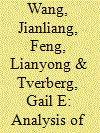

|
|
|
|
|
| Publication |
2013.
|
| Summary/Abstract |
Many people believe that China's economic growth can continue almost indefinitely. For a manufacturing-based economy such as China's to continue to grow, it needs an adequate supply of inexpensive energy. To date, this energy growth has primarily come from coal, but China's indigenous coal supplies are now falling short of the amount needed to support this growth. In this situation, the status of China's future coal supply will be very important for China's future economic development. Our analysis shows that China's ultimate recoverable coal reserves equal 223.6×109 MT, and its production will peak between 2025 and 2030, with peak production of approximately 3.9×109 MT. The extent to which China can import coal in the future is uncertain. With rising coal demand, this combination is likely to create a significant challenge to China's future economic development.
|
|
|
|
|
|
|
|
|
|
|
|
|
|
|
|
|
|
|
|
|